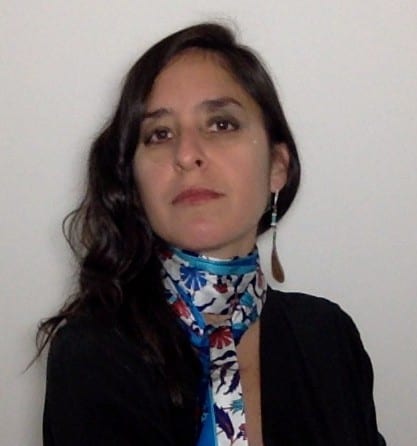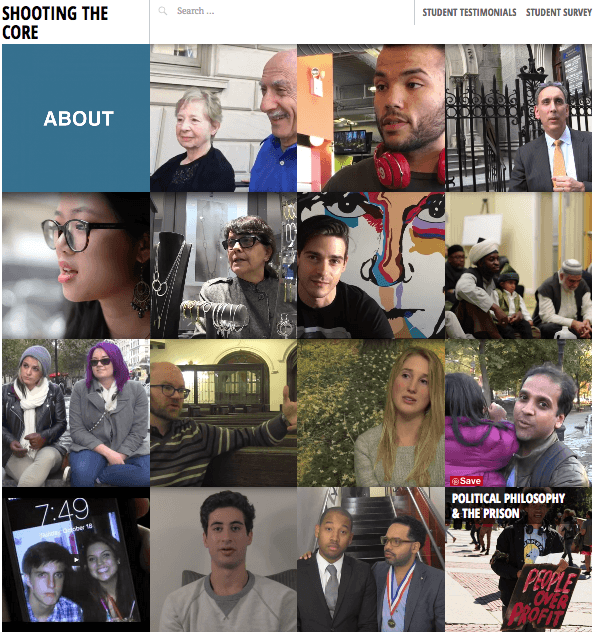Alhelí Alvarado-Diaz on Reinterpreting Core Texts through Film, Documentary, and Reportage

Dr. Alhelí Alvarado-Diaz, a 2015 Hybrid Learning awardee and lecturer in the Department of History at Columbia University.
Dr. Alhelí Alvarado-Diaz, a lecturer in the Department of History at Columbia University since 2010, teaches Contemporary Civilization—a two-semester Core Curriculum course that introduces students to some of the most important ideas and debates on moral philosophy, religious politics and political theory from Plato to Locke, and social theory, revolutionary politics, civil rights, and individualism from Rousseau to Hannah Arendt.
Alvarado-Diaz was one of eighteen spring 2015 grant recipients of the Office of the Provost’s Hybrid Learning Course Redesign and Delivery Request for Proposals aimed at improving instructional delivery and learning outcomes of Columbia University students. In Dr. Alvarado-Diaz’s proposal, she suggested a new, engaging approach to addressing universal political and moral questions, and promoting critical reflection and thinking on how ideas and dilemmas raised hundreds of years ago are still pertinent today.
For Alvarado-Diaz’s Shooting the Core project, students work in groups to create a short video clip where they examine the topics discussed in class and draw connections to current events through the lens of the diverse community found outside the university. Students are challenged to apply what they have until now viewed as abstract concepts into everyday life and current events.
The result is the opportunity to develop a deeper understanding and capacity for lifelong application of the moral philosophy and social theory covered in their Contemporary Civilization course. In the process of conducting research and creating video narratives for an outside audience, students explore the difference of opinion shaped by the diversity of cultures, religions and life experiences of the people they interview. Working collaboratively students learn to negotiate, delegate and coordinate responsibilities to reach a common goal.

For Alvarado-Diaz’s Shooting the Core project, students work in groups to create a short video clip where they examine the topics discussed in class. To view the entire collection of videos, visit the Shooting the Core website.
We spoke with Alvarado-Diaz about her initial reflections on the experience of incorporating this project into her course.
Why did you apply for this initiative?
Shooting the Core was born as a desire to adapt and reinvent the Core Curriculum. It specifically redesigns the teaching and learning experience in the yearlong course Contemporary Civilization. Envisioned as an exploration of the core moral and political issues since Plato to our days, Contemporary Civilization encourages students to become critical thinkers and observers of the political world, at the local and global levels.
“Students in my course become active researchers, interviewers, and interlocutors in conversations that emphasize the relevance of ancient texts in the world of current affairs.”
How did this project change the way that students interact with the course content?
Contemporary Civilization was first taught as a course in 1919. In its traditional form, the Core exposes students to the great classics in political thought and moral philosophy. It is a predominantly western and male canon. In Shooting the Core, the curriculum itself is under question, which means not to eliminate it but rather to revitalize it. Revitalizing the Core demands a radical restructuring of how the texts are transmitted to the students. In my version of Contemporary Civilization, students find personal meaning in the readings; they relate the texts to concerns that are pertinent to their cultural context. As a historian, I encourage my students to think and react to the texts contextually. Politics and philosophy need context. Without context theory is meaningless; it becomes obsolete.
The texts from Contemporary Civilization are provocative elements for the students. Through reading, discussing, and analyzing the texts, students learn foundational concepts in political theory. They ask questions about motivations, ambiguities, and contradictions. Shooting the Core allows students to work as collaborators in small groups, producing taped interviews where they explore the unresolved paradoxes of each philosophical work. In addition to a video, students write a paper in which they explain how their video connects to the texts under examination. Shooting the Core integrates textual knowledge with new media and technology, making the students’ productions accessible to others outside academia.
“Politics and philosophy need context. Without context theory is meaningless; it becomes obsolete.”
What do you expect students to get out of this experience?
In Shooting the Core, students not only think and observe, but they also act and incorporate the views and responses of other New Yorkers who are outsiders to the Curriculum. Students in my course become active researchers, interviewers, and interlocutors in conversations that emphasize the relevance of ancient texts in the world of current affairs. Students are no longer consuming the texts of the curriculum; they are actively creating a new life for the texts that is meaningful to them and to others outside the academic setting. The creative and social approach of Shooting the Core transforms and empowers students into makers of knowledge.
“Shooting the Core integrates textual knowledge with new media and technology, making the students’ productions accessible to others outside academia.”
Students come out with a meaningful and memorable experience in which they recognize the pertinence of political theory and moral philosophy today. Regardless of their final professional choices, I want my students to recognize the philosopher and the critical thinker within each one of them. I want my students to recognize their value as social agents in a diverse community that transcends the reduced perimeter of the university campus.
Students in Dr. Alhelí Alvarado-Diaz’s Contemporary Civilization course share their experiences working on the course’s Shooting the Core project. Students worked in groups to create a short video clips where they examined topics discussed in class through the lens of the diverse community found outside the university.
I want students in the Contemporary Civilization to take advantage of the extraordinary social and political ecosystem that is New York City. I want them to see the application of political theory in the everyday lives of New Yorkers. By being in contact with the diverse world of the city, students develop social sensibility. The acquisition of this sense of solidarity and social sensibility will transform students into responsible leaders, professionals, thinkers and citizens in the 21st century.
The CTL looks forward to continuing to work with Dr. Alvarado-Diaz to develop and evaluate this new approach.
Inside the Box
In Shooting the Core, students engage in deliberation with their classroom peers, using investigation and reportage to document their conversations with a wide range of individuals from the university community and beyond. The purpose of Shooting the Core is to encourage students to observe the afterlives of political philosophy beyond the bubble of academia and the university campus.
Learn More
- Class size: 20-22
- Level: Undergraduate
- Place in curriculum: Core
- Contributors: Dr. Alvarado-Diaz, Aurora Collado
- Work involved:
- Map out all the activities involved in a video assignment.
- Secure equipment and software and rules of use for students.
- Provide resources and support for developing students’ skills in areas outside of your expertise such as video production.
- Develop rubrics to provide guidance and feedback to students.
- Be prepared to explain your approach to students, including the advantages and what you expect them to take away.
- Evaluate the student experience and use feedback to improve the process.
- Time needed: 3 months
- Resources: http://edblogs.columbia.edu/shootingthecore/
- Get started! Contact us at ColumbiaCTL@columbia.edu to learn about opportunities to develop similar projects and our relevant programs and services.
Instructors in Action
CTL staff pair up with instructors at Columbia to transform their classrooms and create engaging learning experiences.
Inside the Box
Could you implement a similar project in your classroom? See our Inside the Box feature at the end of the article to learn more about the resources required and how the CTL can provide support.